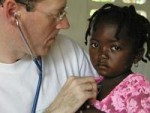Health leader visiting campus

Each year, 10 million children in developing countries die before reaching their fifth birthday, many of them from treatable diseases that extreme poverty and a lack of access to health care render deadly, according to the World Health Organization.
Forty million people live with HIV, 95 percent of them in developing countries. More than 1,600 women die every day from childbirth-associated complications that adequate medical care could have prevented. Nearly 1.1 billion people must drink contaminated water, and suffer from debilitating and sometimes deadly diseases as a result.
The magnitude of the health care problems in developing countries may seem overwhelming, but for global health care crusader Paul Farmer – who brings his message of global health care equity to USF tonight – all these problems and more are manageable, given the right commitment and the right approach.
Farmer – noted physician, author, scholar and activist – will deliver a speech entitled “Social Justice and Global Health Equity” tonight at 7 as part of the University Lecture Series. He will speak about his work in countries like Haiti and Rwanda, and his mission to bring basic health care to the most impoverished places in the world. His speech is free to the general public.
“He really has something to tell us about how to understand the forces at work in our world and how to be a better global citizen,” said Susan James, coordinator of international programs in USF Health and the College of Public Health, which co-sponsored the lecture along with the department of anthropology and the Kiran C. Patel Center for Global Solutions, among others.Farmer, who calls himself a medical anthropologist, founded Partners in Health (PIH), a non-profit organization that calls its mission one of medicine and morality. PIH, whose operations began as a small base for medical treatment in a squatter settlement in Haiti in 1985, has expanded to an international medical provider that now treats more than 1,000 people per day in Haiti and has operations in Peru, Siberia, Rwanda and inner-city Boston.
“(Farmer) has a vision of how the world as a whole could be more peaceful and cooperate on the international, national, local and family levels to make the world healthier,” James said.
A leader and an inspiration
When second-year USF medical student Erin McIvey traveled to countries like Tibet, Cambodia, Laos and Vietnam, she felt overwhelmed by the problems faced by the natives of these countries, where some “hospitals” and “clinics” pass for health care facilities in name only. People seemed to think she was “crazy” when she talked about providing medicine to the poor, an endeavor with costs some see as insurmountable.
Then a friend gave her Mountains Beyond Mountains, a firsthand account of the life and work of Farmer written by Tracy Kidder. After that, everything seemed possible, wrote McKivey in an essay about the impact that Farmer had on her life.
“Paul Farmer is the reason why I am in medical school,” McIvey wrote in the essay. “Knowing there are others out there who have made it and who are selflessly working to better the health of those who so desperately need it makes me able to study that much more, and fight to get my degree.”
McIvey and other USF faculty and students submitted essays about Farmer’s impact on their fields and work in the hope they would have the privilege of introducing Farmer before his speech. So much interest existed that James said she had to create the essay competition.
Farmer is known not only for his work in the field, but also for his work as a thinker on global health. He advocates liberation theology, an interpretation of the Gospels that emphasizes the Christian mission to bring justice to the poor and oppressed. He also speaks and writes about “structural violence” of denied opportunities and economic deprivation, and the ways they systematically kill millions of people who lack access to what Farmer says are fundamental human rights: access to health care, food, clean drinking water and education.
“Something so precious as health should be viewed as a right, not a commodity,” Farmer said in an interview with WBUR, a Boston radio station.
Much of Farmer’s work centers around providing affordable health care to the poorest countries with a community-based model that trains citizens to administer health care to their neighbors.
“He has an understanding of who’s going to make the difference in health care,” James said. “There’s probably never going to be enough doctors. The local people in African villages and the local people in inner-city Boston are the ones who are really going to make the difference.”






